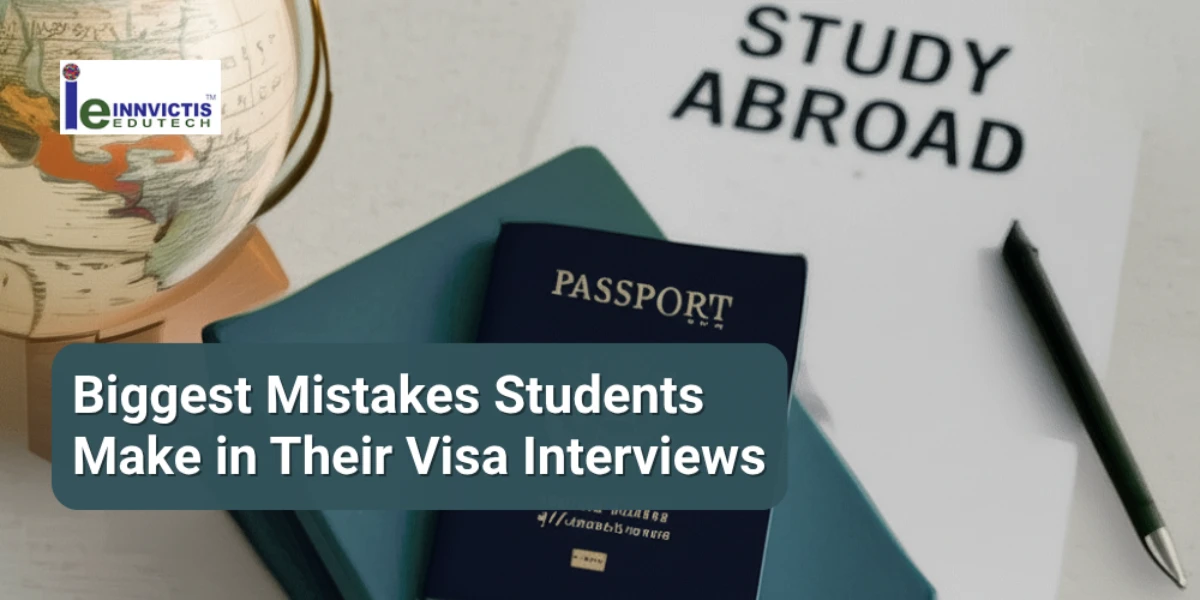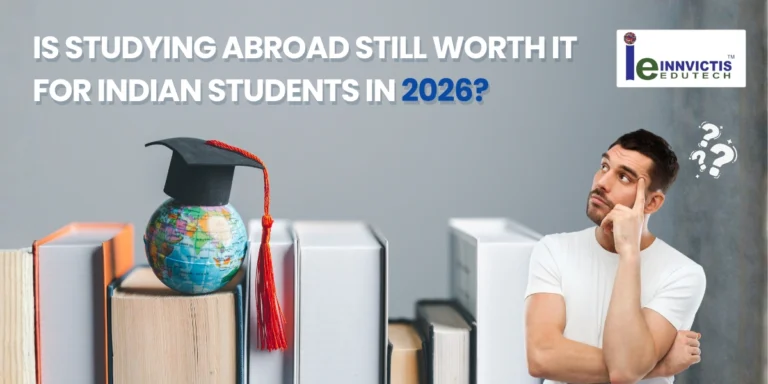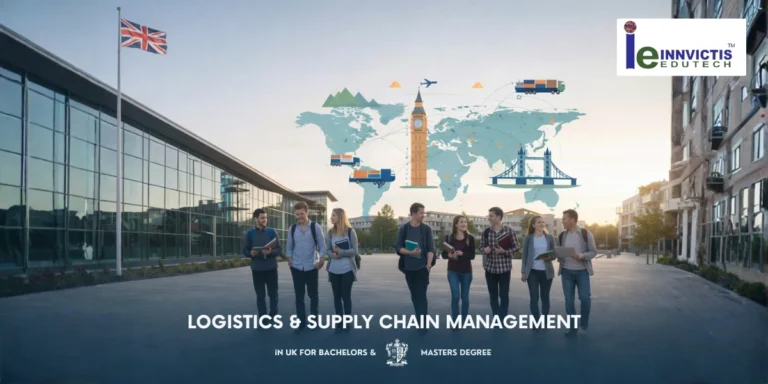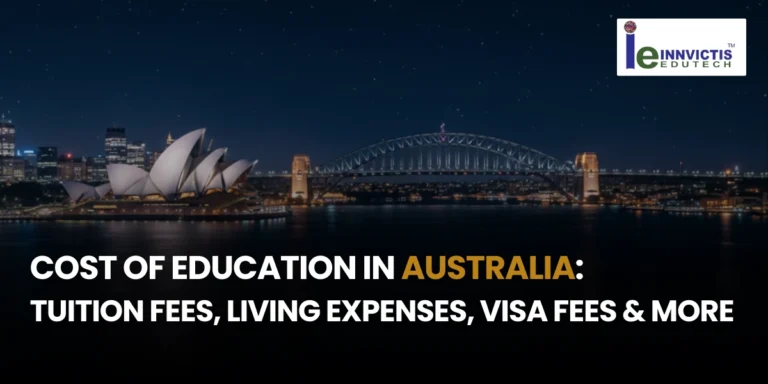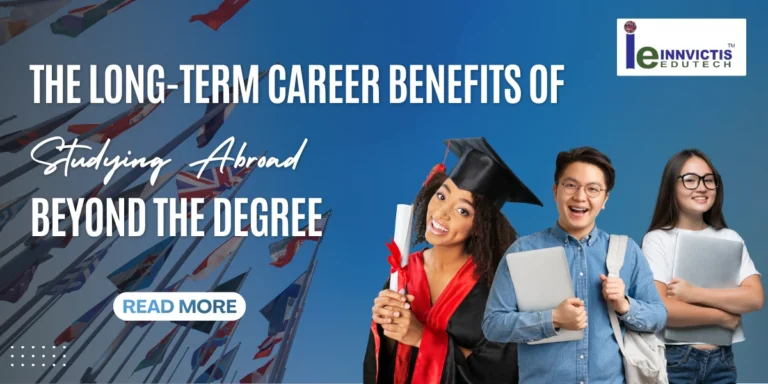Securing a student visa is a major step toward international education, and the visa interview frequently stands as the ultimate challenge. It’s completely understandable that many aspiring students feel a lot of anxiety at this stage. In this blog, let’s talk about why the interview matters, the most common mistakes students make, and how to avoid them, using clear & simple language.
Why the Visa Interview Matters
The visa interview is your big chance to show the officer you’re a serious student. They just want to make sure you genuinely plan to study, have enough money, and intend to go back home once your program is done. Do well in this interview, and you’ll likely get your visa; make mistakes, and it could lead to a rejection. The visa interview is your main chance to prove you are a genuine student.
- The officer checks if you truly plan to study and have chosen your course and university carefully.
- It’s completely understandable that many aspiring students feel a lot of anxiety at this stage.
- The officer wants to see if you plan to return home after your studies, not stay abroad permanently.
- The interview is usually short, so you need to be clear and honest in your responses.
- Thorough preparation and honest answers are your best bet for visa approval; conversely, errors or unclear information could lead to a rejection.
Top Mistakes Students Make in Visa Interviews
Applying for a student visa is a crucial step towards studying abroad. But, it can be a tricky process, and even small mistakes could cause big delays or even a rejection. By understanding and proactively addressing these common errors, you can greatly enhance your chances of a successful application.
Missing Documents
This is one of the most frequent causes of visa application problems. Visa officers require a complete and accurate set of documents to assess your eligibility. Any omission or inaccuracy can immediately raise doubts and lead to a rejection.
- Incomplete Submissions: Every single document listed in the official visa requirements for your target country must be provided. This includes, but is not limited to, your passport, academic transcripts, financial statements, and the official letter of acceptance from your educational institution. Do not assume any document is optional.
- Outdated Information: Ensure all submitted documents are current and valid. An expired passport, a financial statement older than the specified period, or an outdated university acceptance letter can invalidate your application.
- Inaccurate Information: Double-check all forms and documents for discrepancies or simple typos. Consistency across all submitted information is crucial.Even a tiny mismatch can be a red flag.
- Poor Quality Copies: If you are required to submit copies, ensure they are clear, legible, and properly scanned. Blurry or unreadable documents will be treated as if they were never submitted.
Insufficient Proof of Funds
A primary requirement for any student visa is to demonstrate that you possess adequate financial resources to cover your tuition fees and living expenses for the duration of your studies without the need for unauthorized employment. This assures the host country that you will not become a financial burden.
- Not Enough Money: You must show that you have access to enough funds to cover your tuition fees for at least the first year (or as specified by the embassy/consulate), in addition to your living costs for the entire period of your intended stay. Research these costs thoroughly and do not underestimate them.
- Unclear Source of Funds: The money must be genuinely available and its origin transparent and legal. Large, unexplained, recent deposits into your account can be viewed with suspicion. Provide clear bank statements, official loan approval letters, or sponsor letters that explicitly detail the source and availability of funds.
- Funds Not in Your Name (or Sponsor’s Name): Generally, the funds should be held in your own name or in the name of an immediate family member (e.g., parent, legal guardian) or official scholarship provider who has formally committed to financially supporting your education.
Weak or Unconvincing “Ties to Home Country”
Visa officers need assurance that you intend to return to your home country upon the completion of your studies. This is a critical aspect of student visa applications, as countries want to ensure that individuals are not using a student visa as a means to immigrate permanently.
- Family Connections: Highlight strong family ties such as immediate family (parents, siblings, spouse, children) or even extended family members for whom you have significant responsibilities or connections.
- Future Job Prospects: Clearly articulate your career aspirations in your home country and how the education you plan to pursue abroad directly contributes to achieving these specific goals upon your return.
- Property or Assets: If you own property (real estate, vehicles) or have significant financial investments/assets in your home country, these serve as tangible evidence of your roots and intent to return.
- Social or Community Involvement: Demonstrate your engagement in your local community, whether through memberships in clubs, religious organizations, volunteer work, or other social affiliations.
- Vague Intentions: Avoid generic statements about returning. Be specific and provide a clear narrative that connects your studies abroad with your long-term plans back home.
Not Paying Fees on Time
The student visa application process involves several fees, including application processing fees, SEVIS fees (for the US), and potentially biometrics fees. If there are delays or mistakes with your payment, your application could get stuck, leading to extra stress and even a rejection.
- Overlooking Deadlines: Be vigilant about all fee payment deadlines associated with your university application, tuition deposits, and the visa application itself. Missing a deadline can lead to your application being put on hold or even cancelled.
- Incorrect Payment Methods: Ensure you use only the accepted payment methods specified by the embassy or consulate. Verify that your payment clears successfully to avoid issues.
- Missing Confirmation: Always keeps proof of payment, such as receipts or transaction confirmations. This documentation is crucial in case of any queries or discrepancies regarding your payment.
Scheduling Your Visa Interview Too Late
The timing of your visa interview is a critical logistical component of the application, especially concerning your university’s program start date. Underestimating wait times can mess up your enrollment.
- Underestimating Wait Times: Interview slots, especially during peak application seasons, can be booked months in advance. Do not assume last-minute appointments will be available.
- Ignoring Processing Times: Even after a successful interview, it takes time for the visa to be processed, printed, and issued. These processing times vary significantly by country and can also be affected by administrative processing requirements.
- Missing Program Start Date: If your visa is not issued by your program’s official start date, you might be required to defer your admission, which can lead to significant financial and academic setbacks. Aim to have your visa approved well in advance of your travel plans.
Poor Interview Performance
The visa interview, though often brief, is your opportunity to directly communicate your genuine intent to study and clarify any aspects of your application. Your demeanor, clarity, and consistency are all evaluated.
- Lack of Confidence: While natural to be nervous, try to project confidence. Speak clearly, maintain appropriate eye contact, and answer questions concisely.
- Inconsistent Answers: Ensure your verbal responses during the interview align perfectly with the information provided in your written application documents. Any inconsistencies can lead to suspicion.
- Unclear Purpose of Study: Be prepared to articulate precisely why you chose your specific course, institution, and country. Vague or unconvincing answers can suggest a lack of genuine academic interest.
- Inability to Explain Financials: Even if a sponsor is funding your education, you should be able to clearly explain the financial arrangements and how your studies will be fully funded.
- Poor Body Language: Be mindful of your non-verbal cues. Fidgeting, avoiding eye contact, slouching, or appearing evasive can create a negative impression. Present yourself professionally and calmly.
Tips to Avoid Common Visa Interview Mistakes
- Get Your Documents in Order: Make a checklist and ensure everything you need is neatly arranged and ready.
- Practice What You’ll Say: Be ready to explain why you picked your course and university, and how you’ll pay for everything.
- Be Honest: Always tell the truth, and make sure what you say matches your documents.
- Speak Clearly and Confidently: To enhance clarity and confidence in your speaking, practice in front of a mirror or with a friend.
- Stay Calm: Take a few deep breaths, dress smartly, and get to your interview early to keep your cool.
- Show You Have Money: Bring bank statements or letters from sponsors to prove you can cover your school and living costs.
Pro Tips to Master Your Visa Interview
- Understand Why They’re Asking: The visa officer mainly wants to confirm you’re a genuine student and that you plan to return home after studying.
- Be Ready for Standard Questions: Know all the details about your course, university, and what you plan to do after graduating.
- Show You’ll Return Home: Talk about family, job opportunities, or anything else that will bring you back to your home country after your studies.
- Practice with Someone: Do mock interviews with friends or family; it’ll boost your confidence and help you refine your answers.
- Keep Answers Short and Sweet: Only answer what’s asked. Keep your responses brief, clear, and to the point.
The visa interview is important, but with good preparation, you can do well. Avoid common mistakes like missing documents, giving wrong answers, or looking nervous. Be honest, confident, and organized. This will help you get your student visa and start your study abroad journey.
FAQs
Q: What documents do I need for my visa interview?
You need your passport, visa application, admission letter, proof of funds, and academic records.
Q: What if I don’t know the answer?
Just take a breath and say you’re not sure. Don’t make up answers.
Q: How can I show I will return home?
You’ll want to discuss your ties to your home country, whether that’s your family, future job prospects, or other significant connections.
Q: Does my English have to be perfect?
No, but speak clearly and try your best. If you need help, ask for it.
Q: What should I wear?
Dress neatly and look professional.
With these tips, you can go for your visa interview with confidence and increase your chances of success.

